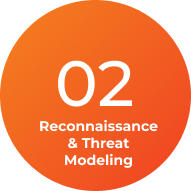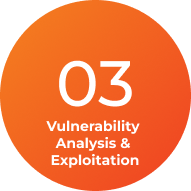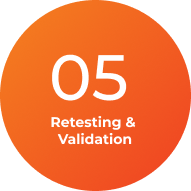SECURE MISSION CRITICAL APPS
THICK CLIENT PENETRATION TESTING
Thick client applications have become increasingly attractive targets for hackers in today’s hybrid infrastructure architecture models. Their extensive use across organizations, often involving critical and sensitive data processing, presents significant security challenges. Thick Client penetration testing is an ethical hacking security assessment carried out to uncover vulnerabilities in the thick client software application, network traffic, and backend interface and prioritize remediation efforts to mitigate cyber risks.
Tell us
about your scope
What You'll Get

Key findings, risks, impacts, and critical recommendations.

Overview of methodologies, standards, tactics, and techniques used.

Detailed vulnerability analysis, reproduction steps, PoC, evidence.

Strategic and tactical walkthrough on how to fix vulnerabilities.

Comprehensive advice on cybersecurity enhancement strategies.

Offered once vulnerabilities are fixed.
SECURE YOUR THICK CLIENTS
What is Thick Client Penetration Testing?
Thick client application testing is generally more complicated and customized, involves both local and server-side processing, and often uses proprietary protocols for communication aimed at detecting and identifying loopholes and vulnerabilities before they are exploited for malicious gain. Simple automated scanning is not sufficient and testing thick client applications requires a lot of patience and a methodical approach.
At Secragon, we specialize in predominantly manual penetration tests, conducted by experienced ethical hackers. Along with leveraging industry standard methodologies to ensure a thorough security assessment is conducted under safe and controlled conditions, our expert team utilizes an advanced mix of public and in-house developed exploits and in-depth analysis to discover complex vulnerabilities not yet published and often, not yet discovered. The objective is to penetrate the target application, document the threat profile, and provide a clear risk mitigation strategy.
We don’t just point out security holes; we help you solve them and comply with standards and regulations.

Identifies security weaknesses within the client application, network communication, and backend interactions.
Ensures that critical and confidential data processed by the application is safeguarded against unauthorized access or breaches.
Helps in meeting industry-specific security regulations and standards, reducing the risk of legal and compliance issues.
Builds confidence among users and stakeholders by demonstrating a commitment to security, especially in environments with sensitive data transactions.
Avoids the costly consequences of security breaches, including financial losses, customer trust erosion, and damage to brand reputation.
Keeps pace with the changing landscape of cybersecurity threats, particularly important with the increasing sophistication of hacker techniques.
Why Conduct a Thick Client Penetration Test?
Conducting a Thick Client Penetration Test is vital to ensure the security and integrity of desktop-based applications, particularly as they become more susceptible to sophisticated cyber threats in today’s hybrid work environments.
PROTECT AGAINST THE LATEST THREATS
When Should You Perform Thick
Client Application Penetration Testing?
Penetration Testing should be performed as frequently as required by the organizational security policy. In addition to the regular schedule, penetration testing is particularly advisable in the following instances:
Before
Launching a New Application
To identify and rectify any security vulnerabilities before the application is deployed to users.
Following a
Security Breach or Incident
To thoroughly understand the scope of a breach and to ensure all vulnerabilities are addressed post-incident.
After Significant
Updates or Changes
To ensure new or modified features haven’t introduced vulnerabilities.
In Response to
New Threats or Vulnerabilities
Whenever new threats that could potentially affect the application are identified.
Regularly as
Part of Security Audits
Conduct these tests periodically, such as annually, as part of an ongoing security maintenance program.
When Integrating with
New Systems or Technologies
To ensure that new integrations or technology upgrades do not introduce security flaws.
We Provide Expert Solutions And Definite Results

Transparent
Pricing
Clear, upfront, with no
hidden costs.

Dedicated Project
Manager
Your security is our
commitment.

Retesting After
Fixes
Ensuring threats are
truly eliminated.

Affordable
Expertise
Premium protection,
reasonable rates.

Customized
Approach
Solutions fitted to your
specific needs.

Proactive
Protection
Effectively securing your
digital assets.
What Will Be Assessed During a Thick Client Penetration Test?
During a Thick Client Penetration Test, several key areas are typically assessed to ensure the security of the application:
Local Data Storage
and Encryption
Examining how data is stored locally and whether encryption methods are used effectively to protect sensitive information.
Communication with
Server and Network
Security
Assessing the security of data transmission between the client and the server, including the inspection of network protocols and encryption used.
Authentication and
Authorization Mechanisms
Testing the robustness of mechanisms for
user verification and access control within
the application.
Error Handling and
Logging
Evaluating how the application handles errors and whether it inadvertently exposes sensitive information or logs in an insecure manner.
Input
Validation
Evaluating the security of data in transit, focusing on the implementation of SSL/TLS encryption.
Dependency
Security
Reviewing third-party libraries and dependencies used in the application for known vulnerabilities.
Our Penetration Testing Process
If your organization has not gone through a penetration test before, you may not know what to expect. Even if you have, maybe you are wondering what Secragon’s stages of penetration testing are. Here is a high-level break down of each step of our proven process:

Activities: Engage stakeholders, define targets, plan logistics for efficient, transparent execution.
Outcomes: Scope Validation, Proposal, Contract.

Activities: Environment preparation, OSINT collection, attack scenario planning.
Outcomes: Strategy Development, Threat Insight.

Activities: Vulnerability identification, active exploitation, privilege escalation, execution of realistic attack scenarios, data and information collection, persistence maintenance, and documentation of steps.
Outcomes: Comprehensive Report, including Executive Summary, Technical Details, Impact Analysis, Recommendations.

Activities: Supporting vulnerability remediation with actionable steps and advice, answering follow-up queries.
Outcomes: Remediation Plan, Security Enhancement.

Activities: Validate the effectiveness of remediation efforts through complementary retesting.
Outcomes: Re-test Results, Attestation.
Frequently Asked Questions
Couldn’t find the information you were looking for?

SECRAGON, YOUR CYBERSECURITY PROVIDER
We, at Secragon, are a team of certified ethical hackers, visionary security engineers, seasoned penetration testers, and committed project managers… but first of all – professionals, who LIVE and BREATHE Offensive Security. Along the list of qualifications, titles, and credentials, we bring a real “think outside of the box” mindset to every project and we constantly strive to learn, explore, and push forward to master complex concepts and deliver top-notch services and results.


